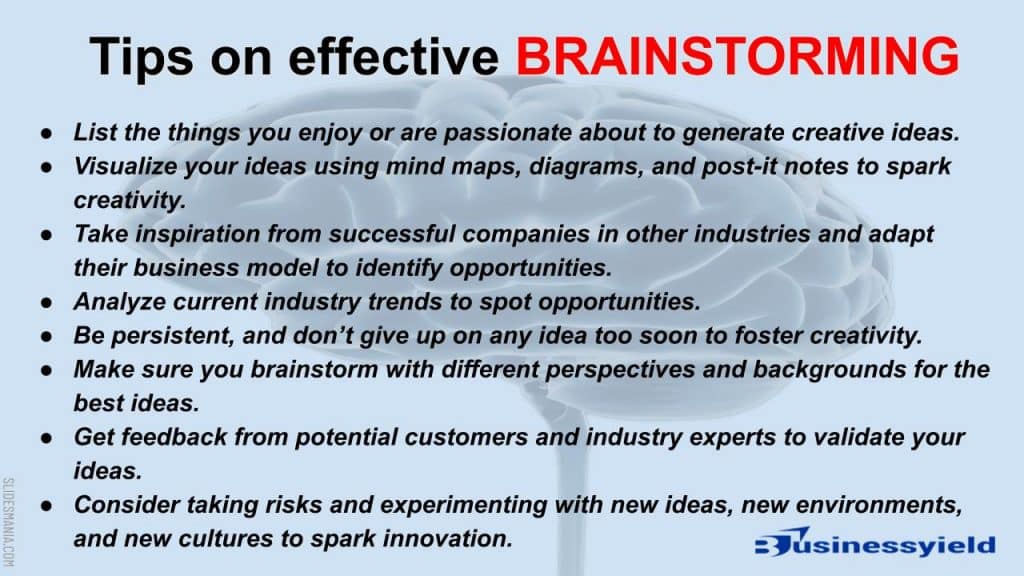Yes, you can start a business, even when you have no ideas. However, starting a small business is a complex task. Success requires a solid business plan, a distinct vision, and knowledge of your target market.
Ready to go? In this post, I will share the steps you should take to start a business right now, even if you don’t have any ideas. It also includes a list of the best businesses you can start in 2024!
Key Points
- Conducting a thorough market analysis of your target market, rivals, and the industry is crucial when launching a small business.
- A thorough business plan should contain a description of your product or service, your target market, financial predictions, and all other pertinent information.
- To target clients and gain an understanding of their industry and competitors, entrepreneurs who want to launch their own business should first undertake market research.
- When starting a business, obtaining finance is essential. Funding can be obtained through grants, loans, venture capital, or crowdsourcing; entrepreneurs might choose to use their funds in addition to these sources.
- Having a strategic marketing plan that takes into account the unique characteristics of the firm, industry, and target market is another crucial component of starting a new business.
What to consider before you start a business with no ideas
When it comes to business chances and ideas, the possibilities are truly endless! However, there are a few things I will like you to consider before you launch a new business on your own! These elements include:
#1. Find your strengths and passions
It may seem cliché to base a business on your passion, but some of the most brilliant ideas for startups have originated from pastimes and interests. Therefore, I will like you to ask questions like: Which activity do you truly love doing? What skills do you possess? Where does your passion lie? What knowledge do you possess? Is there any way you could make a business out of these passions and strengths? You most likely can, in most situations!
You might have an advantage over your rivals if you go into business with knowledge or experience in the field, which you’ll undoubtedly need in the fiercely competitive business world. I guarantee that you will not see it as a chore because you will probably enjoy it more.
#2. Look at gaps in the market
Here, I will like you to take a look around your neighborhood. What services or companies are absent? Could you fill the void in that industry by starting a business? Talk to those in your immediate vicinity, conduct market research, and look for opportunities to close gaps in the industry. Note that the finest businesses meet needs and provide answers to issues.
Additionally, experts and business strategists can also be able to provide you with further information about the state of the market and potential gaps. However, I recommend that you talk to those in your immediate vicinity to reveal their needs and challenges. This will help you identify solutions to meet those requirements. I see this as the best kind of research.
#3. Consider your budget.
I know a lot of people who have fantastic business ideas, but their funds frequently get in the way. Therefore, I will advise you to start your firm modestly and build it gradually if you don’t have a big budget. Make sure you are completely informed on all of the many financial possibilities at your disposal, including bank loans, crowdsourcing, investors, and private financing.
#4. Keep the future
In addition to addressing immediate issues, your company should consider addressing long-term issues as well. Therefore, the more future-proof your business idea is, the more likely it is to succeed. Although you may not be able to forecast the future, you can try to estimate what might be possible by looking at historical trends.
4 Steps to Start a Business with No Business Ideas
I’ll now give you some advice on how to launch a business, even if you don’t have any ideas. Though there are numerous approaches to generating business ideas, you could find the following procedure to be very beneficial.
#1. Carry out brainstorming sessions.
Brainstorming is the first step to starting a business with no ideas. When it comes to brainstorming, most people prefer to use paper and pens because they are more efficient and add a fun and memorable element to the process. If you want to generate enough ideas for your brainstorming session, give yourself at least 15 to 20 minutes.
Based on the considerations I outlined in the previous part, jot down every thought that occurs to you. Make distinct categories for your ideas, and don’t be afraid to allow your creativity to run wild. You never know what ideas you might have!

#2. List out the pros and cons.
Now that you have a list of ideas that you have generated, I will like you to carefully select a few that you believe are your greatest business concepts and begin compiling lists of advantages and disadvantages for each. To make accurate lists of the benefits and drawbacks, you might need to conduct some industry research. The lists should be as detailed as possible!
Moreover, these lists of advantages and disadvantages can help you understand the kinds of challenges you might face daily when managing various enterprises, as well as the likelihood of success for each venture.
- Pick a few of your business ideas from your list of ideas that you brainstormed.
- Make thorough notes of the benefits and drawbacks of each possible company concept.
- For each suggestion, conduct industry research to produce realistic pros and cons.
- Utilize the lists to decide which company concepts are worth pursuing further.
#3. Review your new business ideas.
Here is where you should examine your selections over time. Then you should continue narrowing it down until you have only a handful of concepts that you are passionate about and truly believe in. If you’re having trouble choosing just one, consider how you might be able to bring several distinct business concepts together to produce a single, well-rounded business plan. If at all possible, you should create thorough and organized business strategies for each of your possibilities and conduct additional market research to learn more.
#4. You should consult a business consultant.
I will suggest that you engage a business consultant or expert at this point in the process. Platforms like BusinessYield can review your proposed solutions and business ideas and assist you in determining which ones are likely to work and which ones will not. They can also provide you with insight that you might not be able to get elsewhere and very helpful recommendations on how to proceed with each concept you have generated.
How do I create a business plan?
#1. Compose an executive summary.
This serves as your elevator pitch. A mission statement, a synopsis of the goods and services your company provides, and an overview of your financial growth strategies should all be included.
Even though your investors will read the executive summary first, it may be simpler to write it last. In this manner, while writing subsequent parts that delve deeper into depth, you can draw attention to facts you’ve found.
#2. Describe your company.
The description of your company comes next. This includes fundamental details like:
- Your business’s registered name.
- Address of your business location.
- Names of key people in the business. Make sure to highlight unique skills or technical expertise among members of your team.
In addition to defining your business form (such as sole proprietorship, partnership, or corporation), your company description should also detail each owner’s percentage of ownership and level of involvement in the business.
Finally, briefly describe the current state of your firm as well as its past. This sets the reader up to understand your objectives in the following section.
#3. Describe your company’s objectives.
An objective statement appears in a business plan’s third section. This section outlines your goals for the foreseeable future as well as the next several years.
You can use this section to outline how finance will support business growth and how you intend to meet those goals if you’re asking for a business loan or an outside investment. The secret is to make sure the lender understands the possibility your business offers.
For instance, if your startup is introducing a product line, you may describe to potential investors how their contributions will aid in the introduction of that new product and the anticipated increase in sales over the following three years.
#4. Describe your products and services
Here, you will provide specifics about the goods and services you already provide or intend to provide.
The following ought to be mentioned:
- A description of the operation of your commodity or service.
- The way your product or service is priced.
- The customers or clients you deal with.
- Your order fulfillment and supply chain management plan.
You can also talk about any pending or registered patents and trademarks related to your goods or services.
#5. Carry out your market research.
Investors and lenders will be interested in learning what makes your product unique from the competition. Therefore, you will need to describe who your competitors are in the area of your market analysis. Talk about their strengths and make suggestions for how you might improve.
#6. Describe your sales and marketing strategy.
This is where you can talk about how you’re going to convince people to purchase your goods or services, or how you’re going to foster a relationship with them that will encourage repeat business.
Additionally, I advise that you provide specifics about your distribution and sales plans, including the price of each product.
#7. Carry out a business financial analysis.
If your company is new, you might not have much financial data at this point. However, if your company is already established, you should include a balance sheet that includes your debts and assets, a cash flow statement that illustrates how money is coming into and going out of the business, and an income or profit-and-loss statement.
You might be able to get these reports using accounting software. It might also assist you in calculating measures like:
- Net profit margin: This is the percentage of revenue you keep as net income.
- Current ratio: This is the measurement of your liquidity and ability to repay debts.
- Accounts receivable turnover ratio: This is a measurement of how frequently you collect on receivables per year.
I also advise business owners to make use of charts and graphs to help their audience understand.
To learn about Business Analysis, the following articles can be of help: BUSINESS ANALYSIS: What Is It & How Do You Do It, HOW TO BECOME A BUSINESS ANALYST: How to Become a Business Analyst With No Experience(2023 Guide) and Why Become a Business Analyst?
#8. Create financial projections
If you’re looking for funding or investors, this is an essential section of any business plan. It describes how your company will make enough money to pay back the loan or how you will provide investors with a respectable return.
Here, you’ll submit projections for your company’s monthly or quarterly sales, costs, and profits for a minimum of three years, with the future figures presuming you’ve secured a fresh loan.
#9. Explain how your business runs.
Provide an overview of your company’s organizational structure and the roles and duties of each team before closing your business plan. This can assist your readers in understanding who handles the various tasks you’ve listed above, such as creating and marketing your goods and services, as well as the associated costs.
What business can I start from home?
BusinessYield Guide on How To Start A Business From Home
#1. Buy products in bulk and sell them online.
There is no need to start from scratch when launching your first home business. Alternatively, consider a tried-and-true small company concept like buying in bulk popular things and reselling each one separately for a profit.
Locate products that customers are already interested in purchasing, then work out a contract with the distributor to buy them. Next, set up an internet store to market your catalog and take orders.
#2. Sell homemade products
If you’re a maker, or you know someone who is, think about making your passion a business by offering your products for sale. The options are unlimited, ranging from handcrafted jewelry and artwork to soaps and candles made by hand.
Products made in your kitchen, workshop, or studio have the potential to become household names with the correct branding and promotion. Since you can manage almost every element of production and price and won’t have to purchase from wholesalers, selling independent items can also be more affordable.
#3. Start a dropshipping store.
The preferred business strategy for home entrepreneurs who don’t want to handle inventory is dropshipping. Retailers who engage in dropshipping advertise and market goods that are manufactured and delivered by a third party. This means that a dropshipping supplier will handle the product’s storage and delivery to buyers while paying you a commission for the transaction.
I recommend that you focus on one product if you want to succeed. Create a collection of related products on your website by curating products from various sources.
Note that platforms like the Shopify dropshipping app facilitate the process of importing product listings into your online store and connecting you with suppliers.
#4. Offer online services.
Consider offering services instead of goods if you’d rather not sell things online. This is good because service platforms might even be easier to set up than retail establishments.
Making the most of your current skills is one way to grow a home service business. You may create a website to sell your time and experience if your work contract allows you to offer your abilities on an independent basis.
Make money from your technical, musical, artistic, or do-it-yourself abilities by using a website that provides help or training. Typical home business concepts for services include:
- Freelance writing
- Virtual assistance
- Marketing
- Design
- Translation
- SEO Consulting
- Web design and development
- Graphic design
Additionally, the fact that a service-based business doesn’t always require a large client base to turn a profit is another advantage. Depending on the service you offer, a small number of satisfied customers may be enough to allow you to work from home full-time.
#5. Teach online classes.
Why not make money from your teachable expertise and spread the word about it through an online course or in-person instruction?
Offering live or pre-recorded information is an option while teaching classes online. You may charge more for live classes, but students can purchase the recorded sessions at a lower cost. If you would rather instruct small groups of people, think about master workshops, online tutoring services, or mentorship.
Alternatively, make an online course on platforms like Udemy that can be fully downloaded and sold; it might include tutorial videos, templates, articles, or how-tos. To record your voice while you guide students through the content, use a screen-recording application.
#6. Purchase an existing small business.
Some owners of home businesses buy and oversee already-existing small enterprises.
The price of a firm fluctuates according to how healthy it is. Some companies are sold while they’re still making money, so all you have to do is take over.
Others might need to be rebuilt since they no longer bring in a significant amount of money. They might also have priceless assets like a social media following, an email list, or a reputation for their company.
#7. Sell used items
It’s predicted that the global market for used goods will almost quadruple to $350 billion by 2027. Some businesses have made profits by selling vintage items.
You can start small with your own home-based resale business on marketplaces like Poshmark, Craigslist, eBay, or Facebook Marketplace.
#8. Open a photography business.
Selling images online comes with many possibilities, all of which have the potential to be very competitive. Selling stock photography is one tactic you may use. You can do this by creating your own online store or by submitting images to reputable stock photo markets like Shutterstock or Freepik.
You might also pursue a career as a wedding, fashion, or product photographer if you’re interested in building your brand and selecting a certain area of photography.
#9. Start an affiliate marketing business.
Affiliate marketing is a well-liked home business strategy in which you market a company’s goods or services. You receive a commission on sales made by customers who use your affiliate link to purchase an item.
Choosing an affiliate plan is where you’ll have to use your imagination. For instance, some companies decide to use Instagram Stories to advertise their partner brands and products, while others build websites with pertinent material.
#10. Design websites
Although creating a website has never been simple, many people lack the design expertise necessary to produce an engaging user experience.
If you have those abilities, you might launch a home-based website creation business. Search engines such as Upwork are good places to start when looking for your first clients. Gaining clients without the aid of a marketplace should get easier as you complete projects and gather references and samples.
#11. Become a freelance writer
Content writers are in high demand from businesses. Visit LinkedIn and browse the job posts related to writing. You’ll see that businesses need copywriters, journalists, and bloggers, among other skills.
The average yearly compensation for a freelance writer is $48,000, according to ZipRecruiter, with the most in-demand specializations being blog writers and digital marketing writers.
The possibilities for earning money from home as a writer are as endless as your creativity. Consider writing ebooks, a newsletter that subscribers receive every week, or even sponsored postings on social media.
#12. Start a house cleaning service.
Cleaning people’s homes might help you start a home business while they commute to work. With a range of cleaning services in demand, the global market for house cleaning services is anticipated to reach $10 billion by 2026.
Remember to get business insurance and run the required background checks on the staff members who will be representing your company.
What is the easiest business to start?
Here is a list of easy-to-start businesses:
- Freelance services
- Online reselling
- Tutoring or coaching
- Event planning
- Cleaning services
- Pet sitting or dog walking
- Home-based bakery or food service
- Personal training or fitness coaching
- Handmade crafts
- Mobile repair services
- Dropshipping
- Social media management
- Graphic design services
- Language Tutoring
- Virtual Assistant
- Mobile car wash
- Social media influencer
- Freelance photography
What business can I start with no skills?
Reselling other people’s goods is a business you can start with no skills. You sell the goods at retail prices after purchasing them at a discount. It is possible to accomplish this with nearly any kind of product in any sector, and success doesn’t require any particular expertise. Additionally, you have the option to begin very modestly and work your way up to selling more items or items in a whole other category.
What is the cheapest business to start?
Starting a business that involves offering your expertise or abilities is typically the least expensive option. Other than creating your website and LLC, there are no expenses because your expertise and experience are the “product.” Coaching services and consulting firms are two examples.
How can I start my own business from home?
To start your home business, you must first do some research to determine your interests and skill levels. This can be a good place to start. From there, you can research business startup ideas that fit your abilities and budget. When your business is home-based, you often require less initial funding to establish and run it.
Do I need to register a home-based business?
Yes, you must register your business with the Secretary of State if you intend to incorporate or create a limited liability company (LLC). This is where newly established companies obtain authorization to operate within the state. Find out how to form an LLC.
How much does it cost to start a home-based business?
Starting a home-based business might cost as little as zero dollars or as much as several thousand. Depending on the good or service you are providing, A freelance writer, for instance, just needs a computer, whereas a candle seller needs inventory.
Do I need money to start a home-based business?
Numerous home-based enterprises don’t have any initial expenses. To do the task and promote your services, you can utilize the computer you already own. Tutors, authors, bookkeepers, and virtual assistants are a few examples of businesses that do not need money to start.
What is the most profitable type of business?
The most successful kind of business will rely on a variety of criteria, including your industry, location, target market, and business plan. Yet, some industries—such as high-end services, luxury items, business-to-business transactions, and subscription-based industries—generally see higher levels of profitability than others.
Therefore, if you’re unsure of the kind of business to launch, think about your skills and passions in addition to the demands of your intended clientele to help you select a successful business concept.
17 Best Small Business Ideas for Teens in 2024
15 Creative Small Business Ideas for Kids in 2024
61+ Small Business Ideas: 2024 Expert Picks + Free Templates






